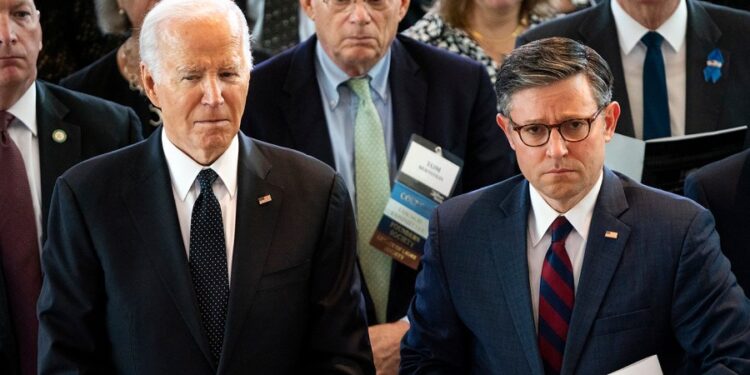
The White House on Monday issued a strong rebuke to a partisan proposal recently rolled out by GOP leadership to avert a government shutdown later this month, as both sides dig in their heels in a pre-election funding showdown.
The White House argued the funding pitch unveiled Friday fell short of providing “necessary resources” for defense programs and veterans, while saying the GOP-backed bill would bring the government closer to “across-the-board cuts to programs Americans count on.”
The Hill has reached out to Speaker Mike Johnson’s (R-La.) office for comment.
Congress has until Sept. 30 to pass legislation to keep the government funded or risk a shutdown.
House GOP leaders on Friday introduced their stopgap plan, also known as a continuing resolution (CR), to keep the government funded into March, while also tacking on language for stricter proof-of-citizenship requirements for voting.
The strategy to pair the stopgap with the Safeguard American Voter Eligibility (SAVE) Act comes as Republicans have sought to seize on immigration and the border as key campaign issues heading into the November elections.
Johnson said Friday that the proposal marks “a critically important step to keep the federal government funded and to secure our federal election process.”
“Congress has a responsibility to do both, and we must ensure that only American citizens can decide American elections,” he added.
The proposed stopgap also puts House Republicans on a collision course with Senate Democrats over timing. Conservatives, bullish about former President Trump’s chances of taking back the White House in November, have been pushing for a stopgap that runs past December, arguing the measure would allow Trump more influence over how the government is funded for much of 2025, if he’s elected.
Democrats have instead pushed for a stopgap that keeps the government funded into sometime during the lame duck period between November and January, while pressing for lawmakers to finish their annual funding work by the year’s end. It’s an argument that even some Republican negotiators have expressed support for, while doubting the effectiveness of the strategy.
Democrats also say the GOP-backed timeline is too close for comfort to an April deadline when lawmakers risk triggering an across-the-board trim to federal programs if they don’t finish their funding work in time.
“A six-month CR would last until the end of March — only 30 days before the sequester deadline from the Fiscal Responsibility Act that would trigger across-the-board cuts if full-year bills are not passed,” the White House said Monday.
“That short window next year would create a much higher risk that those cuts go into effect, resulting in devastating cuts to education and Head Start programs; our veterans, the military, and border agents; food assistance for mothers, babies, and low-income families; food and air safety; and more,” it added.






